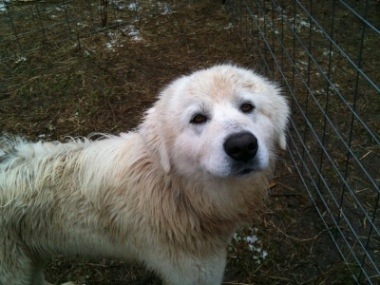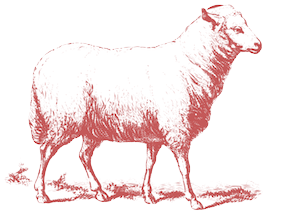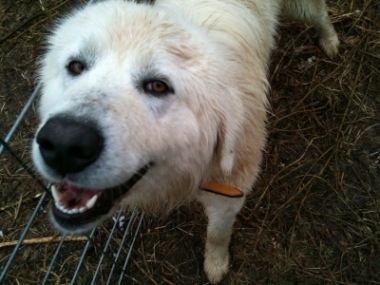Sheep are tasty. They are small and not terribly smart, making them quite easy for a predator (human, canine, feline, or otherwise) to get hold of one and enjoy. However, humans have taken it upon themselves to horde sheep for their own, private consumption. In return for their meat, milk, and fibre, we provide sheep plentiful sources of food and water, along with protection from other creatures that find them just as delectable as we do. This is, essentially, the sacred contract of farming with livestock. In return for their lives, we provide them with food, water, medicine, protection from predators, humane treatment, and a humane death. Consider for a moment which you would rather have happen to you: coyotes kill an animal by opening the abdomen and eating the internal organs, wild dogs will maim to death slowly and violently. Humans kill animals, when we do it correctly, by either stunning with a single blow to the head or else slitting the throat with a sharp knife. Neither is pretty, neither is fun, but you get where I'm going here. The same goes for food and water. Food and water are precious amenities in nature that often shift, dry up, or are otherwise of limited access. Most wild animals spend every minute of their waking lives looking for food. Part of the deal when one raises livestock is that food for the stock is always provided and is easy for them to get. Temple Grandin, whom I love and write about often, says that nature is harsh, but we don't have to be. Agriculture itself is a kind of insurance against the harshness of nature. It is still very much at the mercy of nature, but it allows us some respite from the daily struggle to fill one's belly. Part of how we keep the harshness of nature at bay for animals is by providing them with a similar respite as well as protection through the use of guardian animals.
Guardians are an essential part of any farm that raises small animals. Dogs are the most common and have been used for this purpose the longest. There are literally, a bazillion different breeds of guardian dog, each bread for its home region, type of stock it is works well with, specific behaviors, and specific temperaments. In addition to dogs, farmers have also used llamas and donkey's as effective guardians. For a long time, Ross and I thought we would use llamas to guard our sheep. That all changed, however, when we met Nancy Osborne of Cordero Farms when we were in Vermont last summer. Nancy told a story about the dogs that guard her sheep. Apparently, her farm lost power during a big, midwestern snowstorm. Nancy had painstakingly sorted her sheep into different breeding groups and put a dog with each group. Because of the loss of power, she was convinced that she was going to have a very long couple of days re-sorting everyone. How wrong she was! The dogs not only kept the sheep safe while the electric fences were out, but kept each group of sheep together and separate from the others. This sold me completely, not just on using dogs, but on using a particular breed: Maremmas.
In a nutshell, Maremmas are the Italian version of the well-known Great Pyrenees. They are big, white, bushy dogs with calm demeanors but formidable when they or their charges are threatened. The main difference between the two is that the Pyrenees was bread to guard a perimeter; thus, they wander, sometimes quite far, and don't generally stick with the stock. Maremmas, however, develop a strong bond with their stock and stick with them.
I spent the better part of the past few months learning about these dogs, watching information and questions pass through Maremma list-serves, reading, and talking with breeders and other farmers who keep them. Through this process, I was able to find Frankie.
 Frankie, is an 18-month old Maremma from Washington State. He is an amazing dog. In preparation for his arrival, we borrowed three sheep and six lambs from a neighbor for him to look after until our sheep arrive. It took Frankie a while to adjust to things here. He arrived via 747 jet, clearly a bit traumatized from the experience and wondering where the heck his mom and sheep were. I'm sure he also had a bit of jet-lag; he was quite sleepy for several days. His transiton has been less than perfectly smooth. Due to his privious owner's schedule, we had to take Frankie about two-weeks sooner than we were really ready for. I wanted to make sure all of our fences were up before we brought a dog to the farm, but that didn't happen and on Saturday, we paid the price.
Frankie, is an 18-month old Maremma from Washington State. He is an amazing dog. In preparation for his arrival, we borrowed three sheep and six lambs from a neighbor for him to look after until our sheep arrive. It took Frankie a while to adjust to things here. He arrived via 747 jet, clearly a bit traumatized from the experience and wondering where the heck his mom and sheep were. I'm sure he also had a bit of jet-lag; he was quite sleepy for several days. His transiton has been less than perfectly smooth. Due to his privious owner's schedule, we had to take Frankie about two-weeks sooner than we were really ready for. I wanted to make sure all of our fences were up before we brought a dog to the farm, but that didn't happen and on Saturday, we paid the price.
While we were working on building our chicken houses with a group of volunteers, Ross and I both heard a yelp and saw a flash of white coming down the hill from the barn where the borrowed sheep were. Frankie had gotten out. My theory is that he jumped out of his pen to get nearer to the sheep. The sheep were inside a temporary electro-net fence. Frankie's pen was just outside this fence. We think Frankie must have touched his nose to the electro-net, got a shock, and took off in the opposite direction. Ross and I both yelled "shit!" and took off after him, leaving our poor volunteers quite bewildered. However, once they figured out what was going on, they sprang into action, either following after us or jumping into cars to go patrol the roads. We were able to find him after about half an hour of searching. He had made his way over to our neighbor's pasture, across the creek, and had nestled himself on the side of a steep ledge. The relief I felt was profound. We had him. But a new tension was emerging in me: how in the world were we going to get him back? After looking and talking for a few minutes, we could not figure out a good way to get him down. The whole time, I was just so worried; Frankie had been with us only two days. He had no idea who any of us were or what we were asking him to do. It was not hot outside, but he was panting from stress and several times looked as if he was going to fall asleep standing up. We were all stressed as we floated ideas, tried to get Frankie to come along, only to have it fail. We called our friend Chip, who had been helping us with the chicken houses. He's a firefighter, and so I figured he had some good expirence with these types of rescue missions. My hunch was right, after quite a lot of discussion and a series of failed attempts that only stressed Frankie further. Chip's idea to dig down from the top of the ledge to make it less steep so Frankie might be more inclined to hop up safely worked. Again, there was a sense of huge relief. We breathed again and cheered. Chip took a big, celebratory swig of Gatorade. Ross started walking Frankie through the woods back towards the farm. We thought the long struggle was over. My friend Lauren and I went back up to the barn to reconfigure things so that he would not be able to get out again. After we finished, though, Ross and Frankie had not appeared. Something was wrong. Lauren and I walked down the road towards the bridge that crosses the creek where there seemed to be some activity. The bridge. The damn bridge. Frankie would not cross the bridge. The floor of the bridge is grated steel, something we knew we would have to fix for the sheep to be willing to cross it, but we did not anticipate a dog having such an adverse reaction. In the fray of trying to get him to cross, Frankie had come out of his collar, which made matters more tense. Chip and I hopped in the truck to go get another collar, a long lead, and some wet dog food that would hopefully entice Frankie back into his crate, which we finally resolved, was the best way to move him at this point. It was slow going to get him to accept a new collar and lead and even slower going to get him into the crate. He would not eat the wet food, so the idea of luring him was out. Ross and I spent much of the time just sitting with Frankie, waiting for him to calm down, showing him that we were calm and trustworthy, but this did little to help us progress. Finally, our friend Lauren, who had done some work in vet school and worked in a vets office for several years coached us through forcing Frankie into the crate as carefully and gently as possible. We latched two leads to Frankie's collar so that he could only move forwards and backwards and moved the crate to be directly in front of him. Lauren got behind Frankie, pushing his bum with the side of her foot and gently lowering his head into the crate. Slowly. One. Foot. At. A. Time. He was in. Sweet, sweet relief. We got him. He was safe. Stressed, to be sure, but safe.
The whole process, start to finish, lasted from 2:00pm to 7:00pm. When we got Frankie back up to the barn and settled, Ross bent over and nearly vomited from stress. I gave Lauren a huge hug. I don't know if we could have do it without her help. Afterwards, as I sat there and blamed myself for the mistakes I had made in assuming Frankie would not jump out of his pen and in accepting a dog before our fences were ready, Lauren very kindly and wisely pointed out that this process probably helped Frankie to bond with us, especially Ross. Lauren said she did not think Frankie associated the stress of the afternoon with us. Rather, we were the ones who were with him during a difficult time. I noticed at one point, when we were trying to get Frankie to move in the direction of the crate without a lead, that he walked when Ross walked, and he looked back at Ross every time something changed, as if to ask "is this alright?" It was amazing to see.
What was even more amazing were my wonderful friends and neighbors who helped get Frankie back. Our neighbor, Fuller, without missing a beat, jumped into his truck with Ross to go looking through the pastures. Chip and our neighbor Sarah immediately went hunting for Frankie, offered help and suggestions and stuck with us to the very end. Carter and Laura stayed with the chicken house and kept framing while the search and rescue team went out, erecting the back wall entirely on their own; and our dear Lauren, without whom we would probably still be out there, trying to coax Frankie into his crate. Living out here, doing farm work, I am continually amazed by the generosity and fortitude of the people around me. This kind of thing is the stuff that community is made of. I am so, so grateful.
Frankie is currently doing well. He's out of his pen and with the borrowed sheep. Already he is exhibiting protective behaviors with them, keeping them where they belong, watching them, looking up at any sound or disturbance. He's a wonderful dog. We really got a sense of his character and demeanor on Saturday. The characteristic calmness of Maremmas shone clearly. Frankie could have freaked out with us so many times, but he didn't. In all his stress, he remained quite calm and even submissive at times. He is eating heartily now and enjoying firm butt scratches from us. Now that he's had almost a week to adjust, we are going to begin the real work of training him to us and to our farm. We'll keep you posted.

